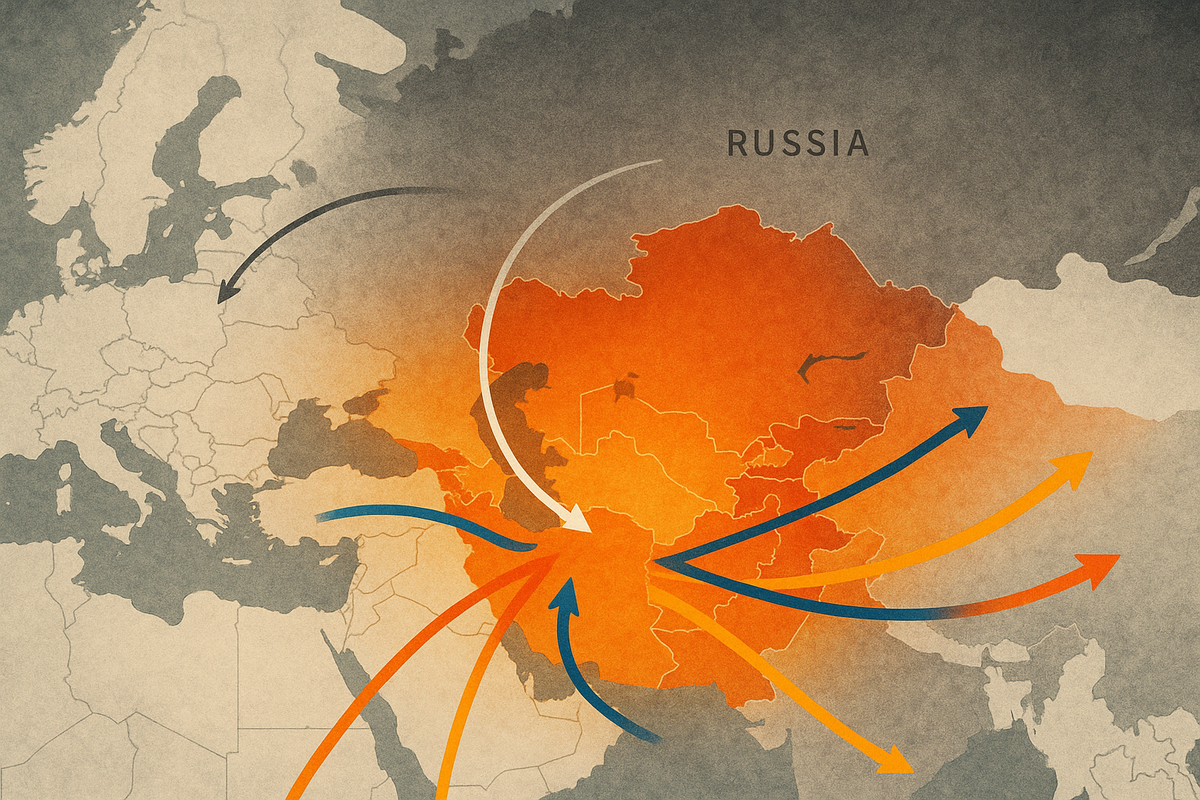
Russia's decision to extend its gasoline export ban, a move primarily aimed at stabilizing its domestic fuel market, has sent significant ripple effects across Central Asian and Eastern European nations. This strategic intervention, prompted by a complex interplay of internal price pressures and substantial disruptions to its refining capacity, is forcing a rapid recalibration of international energy supply chains and highlighting the delicate balance of global energy security and the vulnerabilities inherent in regional dependencies.
What Happened and Why It Matters
The initial ban on most gasoline exports was imposed by Russia from March 1 to August 31, 2025, a measure designed to curb escalating domestic fuel prices and ensure sufficient supply for its internal market. This was subsequently extended from September 1 to September 30, 2025, with ongoing discussions hinting at further extensions potentially through December 2025 or at least until the end of October. The primary drivers behind this protracted restriction are multifaceted. Firstly, Russia has grappled with surging domestic fuel prices, which had reached record highs, necessitating government intervention to prevent runaway inflation. Secondly, Ukrainian drone strikes have significantly damaged at least six key Russian refineries, reducing national refining throughput by an estimated 10-17%, or up to 1 million barrels per day of crude processing. These attacks, coupled with difficulties in repairing facilities due to Western sanctions on equipment imports, have severely impacted domestic gasoline production capacity.
Further complicating the situation are seasonal factors, particularly increased internal fuel demand from the agricultural sector, and persistent logistical challenges in distributing gasoline across Russia's vast geography. Significant disparities between domestic and international fuel prices also incentivized suppliers to prioritize more profitable exports, exacerbating domestic supply issues. While the ban initially targeted non-producing traders and resellers, allowing larger vertically integrated producers limited export rights if domestic supply obligations were met, actual export flows fell sharply.
The ban includes exemptions for members of the Eurasian Economic Union (EAEU) – Armenia, Belarus, Kazakhstan, and Kyrgyzstan – who continue to import Russian gasoline under intergovernmental agreements. Strategic partners like Mongolia and Uzbekistan, with long-term bilateral fuel supply deals, are also largely shielded. However, Central Asian states lacking such specific exemptions, such as Tajikistan and Turkmenistan, along with smaller private importers in Uzbekistan outside official deals, have seen gasoline prices rise by 5–10%. Similarly, Eastern European nations that were traditionally reliant on Russian flows have reported gasoline prices 3–5% above historical norms and are now rapidly seeking alternative, often costlier, suppliers. This situation underscores the critical importance of energy security and the immediate need for diversification in these vulnerable regions.
Market Repercussions: Winners, Losers, and Shifting Tides
The extended Russian gasoline export ban has not only led to regional price hikes but has also instigated a modest 1–2% uptick in global gasoline price benchmarks, prompting significant realignments in international supply chains. This disruption creates a distinct landscape of winners and losers within the global energy market.
Potential Winners:
- European Refiners: Refineries within Europe, particularly those strategically located on the Mediterranean rim, are stepping up production to cover regional shortfalls. Companies like TotalEnergies (TTE:EPA) and Shell (SHEL:LON), with substantial refining capacities, are well-positioned to increase their output and capture a larger share of the European market.
- Middle Eastern Suppliers: National oil companies and refiners from the Middle East, such as Saudi Aramco (2222:TADAWUL), ADNOC (ADNOC.AD:ADX), and Kuwait Petroleum Corporation (KPC), are redirecting gasoline cargoes that were previously destined for Asian or sub-Saharan African markets into affected European and Central Asian regions. This shift enhances their market influence and sales volumes.
- Asian Refineries: Facilities in countries like South Korea and India are adjusting their export volumes to meet the emerging demand in Europe and Central Asia. Companies such as SK Innovation (096770:KRX) and S-Oil (010950:KRX) in South Korea, and Reliance Industries (RELIANCE:NSE) and Indian Oil Corporation (IOC:NSE) in India, are benefiting from this increased demand.
- Global Energy Trading Firms: Major trading houses like Vitol, Trafigura, and Gunvor (the latter two being private entities, but significant market players) are leveraging their extensive logistical networks and market intelligence to arbitrage new supply routes. They are building sometimes more circuitous supply chains to ensure gasoline delivery to deficit markets, potentially increasing their trading margins.
- Logistics and Shipping Companies: Firms specializing in tanker operations and overland transport routes capable of handling longer distances and adapting to new trade flows will see increased demand for their services.
Potential Losers:
- Russian Non-Producing Traders and Resellers: These entities are directly impacted by the ban, losing their ability to export and potentially facing significant financial strain.
- Companies and Consumers in Non-Exempt Central Asian and Eastern European Countries: Businesses reliant on stable and affordable gasoline supplies in countries like Tajikistan and Turkmenistan are facing higher input costs, which can trickle down to consumers through increased prices for goods and services.
- Refineries that were processing Russian crude specifically for gasoline export: While the ban is on gasoline exports, any refinery in Russia that had a significant portion of its output dedicated to export markets will face challenges in re-routing or reducing production.
The market is currently witnessing a strategic pivot, as traditional dependencies are re-evaluated and new trade corridors are established, reshaping the competitive landscape for energy suppliers and distributors globally.
Broader Implications and Historical Context
The extended Russian gasoline export ban transcends immediate price fluctuations and supply shifts, carrying profound broader implications for global energy policy, geopolitical dynamics, and long-term industry trends. This event significantly accelerates the drive towards energy diversification, particularly for European nations, which have been actively seeking to reduce their reliance on Russian energy supplies following geopolitical tensions. The ban on gasoline exports serves as a stark reminder of the vulnerabilities inherent in single-source energy dependencies, reinforcing the imperative for enhanced energy security as a national and regional priority.
Geopolitically, Russia's leverage as a reliable and predictable energy supplier continues to diminish. This vacuum is being filled by alternative producers, primarily from the Middle East and Asia, who gain increased influence and market share. The need to secure alternative supplies is prompting new bilateral agreements and strengthening existing energy partnerships, leading to a more diversified, albeit potentially more complex, global energy landscape. This shift also encourages investment in refining capacity and associated infrastructure in alternative supply hubs, aiming to build more resilient and geographically dispersed production capabilities.
Historically, energy export restrictions, while often serving immediate national interests, frequently lead to market distortions and long-term realignments. A notable precedent is the United States' crude oil export ban (1975-2015). Enacted in response to the 1973 Arab oil embargo and concerns over domestic oil scarcity, the ban aimed to ensure U.S. energy security by retaining domestically produced crude. However, as U.S. shale oil production surged from 2009 onwards, the nation transitioned from an oil shortage to a surplus, rendering the ban increasingly obsolete and distortive. During its existence, U.S. refiners could purchase domestic crude at a discount and then export refined products like gasoline, which were not subject to the ban. The repeal of the ban in December 2015 led to a substantial increase in U.S. crude oil exports, reshaping global crude trade flows, incentivizing further domestic production, and enhancing U.S. energy security and geopolitical leverage. This historical example illustrates that while Russia's gasoline ban addresses immediate domestic concerns, it is likely to have lasting effects on global trade flows and energy security, compelling nations to build more robust and diversified energy portfolios.
What to Pay Attention to Next
As the global energy market continues to adapt to Russia's extended gasoline export ban, several key areas warrant close attention from policymakers, industry stakeholders, and consumers alike. The most immediate concern is the duration and scope of any future Russian export restrictions. Will the ban be extended beyond the current discussed timelines, and will its exemptions or targeted product categories change? Such decisions will significantly influence market stability and the pace of adaptation in affected regions.
Secondly, the stability and efficiency of the newly established supply chains will be critical. The rapid shift to alternative suppliers from Europe, the Middle East, and Asia introduces new logistical challenges, longer shipping distances, and potentially higher transportation costs. Monitoring the seamlessness of these new routes, the availability of sufficient shipping capacity, and the reliability of alternative producers will be paramount. Any disruptions in these nascent supply chains could exacerbate price volatility and deepen supply tightness.
Furthermore, attention should be paid to investment in refining and storage capacity in Eastern Europe and Central Asia. The current crisis underscores the need for these regions to enhance their energy self-sufficiency. Observing whether governments and private entities commit to significant investments in upgrading existing refineries, building new ones, or expanding strategic fuel reserves will indicate long-term strategies for reducing reliance on external suppliers.
Geopolitical developments will also continue to play a pivotal role. The ongoing conflict in Ukraine and broader international relations will influence Russia's energy policy and the willingness of other nations to engage in energy trade. Any shifts in geopolitical alliances or new sanctions could further reshape energy flows. Finally, consumer reactions to sustained higher prices in affected regions will be important. Prolonged elevated fuel costs could impact economic activity, potentially leading to social unrest or demands for government intervention, which could, in turn, influence policy decisions regarding energy subsidies or diversification efforts.
Conclusion
Russia's extended gasoline export ban represents a critical juncture in the global energy narrative, profoundly reshaping regional energy dynamics and reinforcing the universal imperative for diversified, resilient energy supply chains. While Russia's primary objective is to ensure domestic stability amidst internal challenges and external pressures, its actions have catalyzed a significant and likely irreversible realignment in international energy markets. The immediate impact has been tangible: elevated gasoline prices in Central Asian and Eastern European markets, a modest but noticeable uptick in global benchmarks, and an urgent scramble for alternative suppliers.
The long-term implications of this ban point towards a more fragmented, yet potentially more secure, global energy landscape. Nations, particularly those historically reliant on Russian energy, are now aggressively pursuing strategies for energy independence and supply chain diversification. This will likely drive increased investment in refining capabilities in new hubs, foster new trade relationships, and accelerate the transition towards a broader mix of energy sources. For investors, the coming months will offer both challenges and opportunities. Monitoring the stability of new supply corridors, the strategic pivots of major energy companies, and evolving geopolitical circumstances will be crucial. The lasting impact of this ban will be measured not just in price movements, but in the enduring shifts it precipitates in global energy trade, security paradigms, and the collective push for greater resilience against single-source dependencies.






